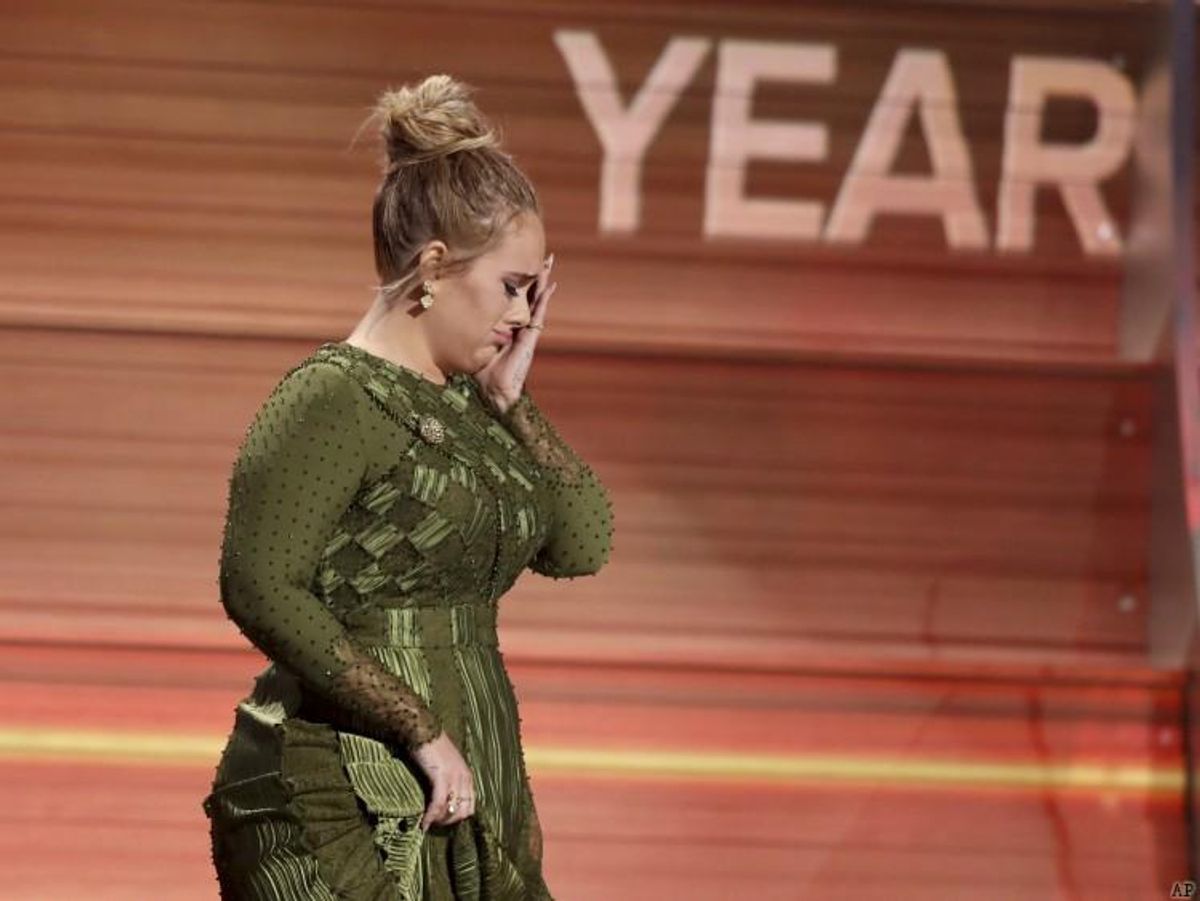At the beginning of the Grammy Awards, Jennifer Lopez evoked the words of Beloved author Toni Morrison to stress the importance of courage in a time when art is threatened.
"This is precisely the time when artists go to work," she recited. "There is no time for despair, no place for self-pity, no need for silence, no room for fear."
The quotation was a stirring kickoff for the Grammys, where throughout the evening, many artists strove to embody this cri de coeur. Katy Perry wore a Planned Parenthood pin and a sequined "persist" armband, in solidarity with the women's movement, as she was outlined by a projection of the U.S. Constitution. A Tribe Called Quest led a chant of "resist!" after a politically charged performance denouncing "President Agent Orange." Laverne Cox, in her introduction to Lady Gaga and Metallica, educated the audience about Gavin Grimm and the fight for transgender equality.
In effect, the evening was a crescendo of resistance to political and systemic oppression. However, this crescendo was cut short when the ceremony's top honor, the Album of the Year, did not go to the artist who fulfilled the promise of Morrison's words. It went instead to Adele's 25.
This is not to say that 25 is without artistic merit. The song "Hello," in particular, is a stirring power ballad of loss and heartbreak, which resonated worldwide. Commercially, it is one of the best-selling albums of all time.
Yet artistically, it does not hold a candle to Beyonce's Lemonade. Upon its release, the visual album was a revelation, which combined music, poetry, and history with themes of feminism and racial injustice. It gave voice to movements like Black Lives Matter. It was beautiful, painful, and daring. Today, when members of vulnerable communities -- women, immigrants, people of color, and queer people -- fear for their safety and rights under a Trump administration, the album seems downright clairvoyant.
In the face of this zeitgeist, The Recording Academy made the wrong decision. And Adele knew it. You could see the embarrassment and confusion swirling in her face when Lemonade was not announced as the winner. For a moment, standing onstage, it seemed like the British artist might reject the music industry's highest honor.
"I can't possibly accept this award," Adele said in her acceptance speech. "And I'm very humbled and I'm very grateful and gracious. But my artist of my life is Beyonce. And this album to me, the Lemonade album, is just so monumental. Beyonce, it's so monumental. And so well thought out, and so beautiful and soul-baring and we all got to see another side to you that you don't always let us see. And we appreciate that. And all us artists here adore you. You are our light."
"And the way that you make me and my friends feel, the way you make my black friends feel, is empowering. And you make them stand up for themselves. And I love you. I always have and I always will," she added.
However, Adele, for all her praise of Lemonade and its social importance, did accept the award, with the "army" of those who helped produce the album standing behind her. "Grammys, I appreciate it. The Academy, I love you," she said.
Yet, did Adele truly love the Academy for putting her in this position, for making her yet the latest example of an unjust voting outcome? Should she have rejected the award, handed it to Beyonce, or made some other symbolic gesture to give voice to those who once again felt silenced and marginalized? Probably, yes.
Adele continued to express her conflicted feelings in the media room after the win, telling reporters, "My album of the year was Lemonade, so a piece of me did die inside, as a Beyonce fan."
But ultimately, it is not about how Adele responded to the award or feels about its deservedness. The issue is how The Recording Academy played it safe in a year when, as Morrison said, there is "no room for fear." Throughout the awards ceremony, there was much talk of the importance of art and politics. Yet when push came to shove, it was the political and artful that got shoved. After all, if Beyonce can't win Album of the Year for creating music about black lives, what other artists have a chance?
In short, Lemonade was robbed. But fortunately, it did win for Best Urban Contemporary Album, which gave Beyonce an opportunity to address the urgency and intent of her work.
"My intention for the film and album was to create a body of work that would give a voice to our pain, our struggles, our darkness and our history, to confront issues that make us uncomfortable," she said.
"I feel it's vital that we learn from the past and recognize our tendencies to repeat our mistakes," she concluded. The Recording Academy would do well to listen.
DANIEL REYNOLDS is an editor at The Advocate. Follow him on Twitter @dnlreynolds.

















































































Viral post saying Republicans 'have two daddies now' has MAGA hot and bothered